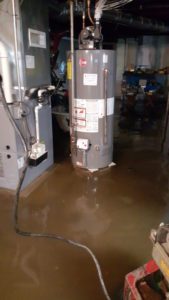Common Causes of Basement Flooding
Date
Wednesday, June 26, 2019
Date
Wednesday, June 26, 2019
 Last week, we talked about basement water damage and ensuing mold damage that occurred in a home in Palm Coast, Florida. In that case, the cause was a failed water heater. But what are some other common causes of basement flooding? If you discover water in your basement, what areas should you inspect in order to stop the invasive water? This week, we’ll take a look at some of the common causes of basement flooding so that you know what to do before water damage becomes widespread.
Last week, we talked about basement water damage and ensuing mold damage that occurred in a home in Palm Coast, Florida. In that case, the cause was a failed water heater. But what are some other common causes of basement flooding? If you discover water in your basement, what areas should you inspect in order to stop the invasive water? This week, we’ll take a look at some of the common causes of basement flooding so that you know what to do before water damage becomes widespread.
Basement Flooding: Where is the water coming from?
Surface Water Flooding
The ground can’t always absorb heavy rains quickly enough. The water table begins to rise and lower floors of your home may flood. If your area is prone to flash floods, you should contact professionals immediately to put the proper systems in place to protect your property and your family.
Improper Slope or Grading of Property
Home sites are supposed to be graded so that the slope of the ground directs water away from the foundation of your home. If this is done incorrectly or if erosion has changed the grading of your land, water can flow towards your home and into your basement.
Missing, Defective, or Improperly Installed Gutters and Downspouts
Gutters and downspouts are designed to collect rainwater from your roof and direct it away from your home. Without them, rain will flow off of the edges of your roof and onto the ground around the perimeter of your home. If you have gutters and downspouts but they are installed improperly, are defective, or are clogged, they won’t do you much good. Extensions at the foot of any downspout should discharge the water a minimum of four feet from your home.
Defective Window Wells
Basements often have windows or small vents on exterior walls. Window wells should be designed to prevent water from entering; improperly designed or defective window wells will act as a drain, funneling any pooled water directly into your home.
Cracks in Walls or Foundation
Even if the grading, gutters, downspouts, and window wells are all designed and installed properly, they won’t prevent moisture and water from entering your home through cracks in your walls or foundation. Inspect your home regularly to make sure there are no issues. Even the smallest cracks can lead to big problems, so be diligent about checking for them. If you find any cracks, be sure to have them repaired immediately to prevent serious property damage.
Broken Water Lines or Water Heater
Your water lines and water heater are the main vehicles to get water to your sinks, toilets, and showers. Worn out plumbing, defective pipes, or a puncture due to construction can all lead to broken water lines. A failed water heater can also create serious flooding problems.
Sanitary Sewer Backups
When it rains heavily, the sewer system can become overwhelmed. The water can’t get through the system fast enough and it begins to back up, sometimes causing sewage to come up through the drains. Clogged sewer lines can cause similar problems. As you can imagine, this not only leads to serious property damage, but to health issues as well.
What can I do about it?
Each of the causes outlined above has its own set of solutions. Outside of basic maintenance and fixes such as unclogging drains and gutters or moving downspouts, in most cases it is best to call in a professional. A professional can diagnose the problem and provide you with solutions to protect your property and your family. Check frequently for moisture, mold, or pools of water in your basement. If you find any, contact a plumber, an appliance technician, or the like, to stop the basement flooding. Then, contact Joe Taylor Restoration to address the water damage and any resulting mold damage, and restore your property to its original condition.
https://www.drainageanderosion.com/blog/common-causes-water-basement/

